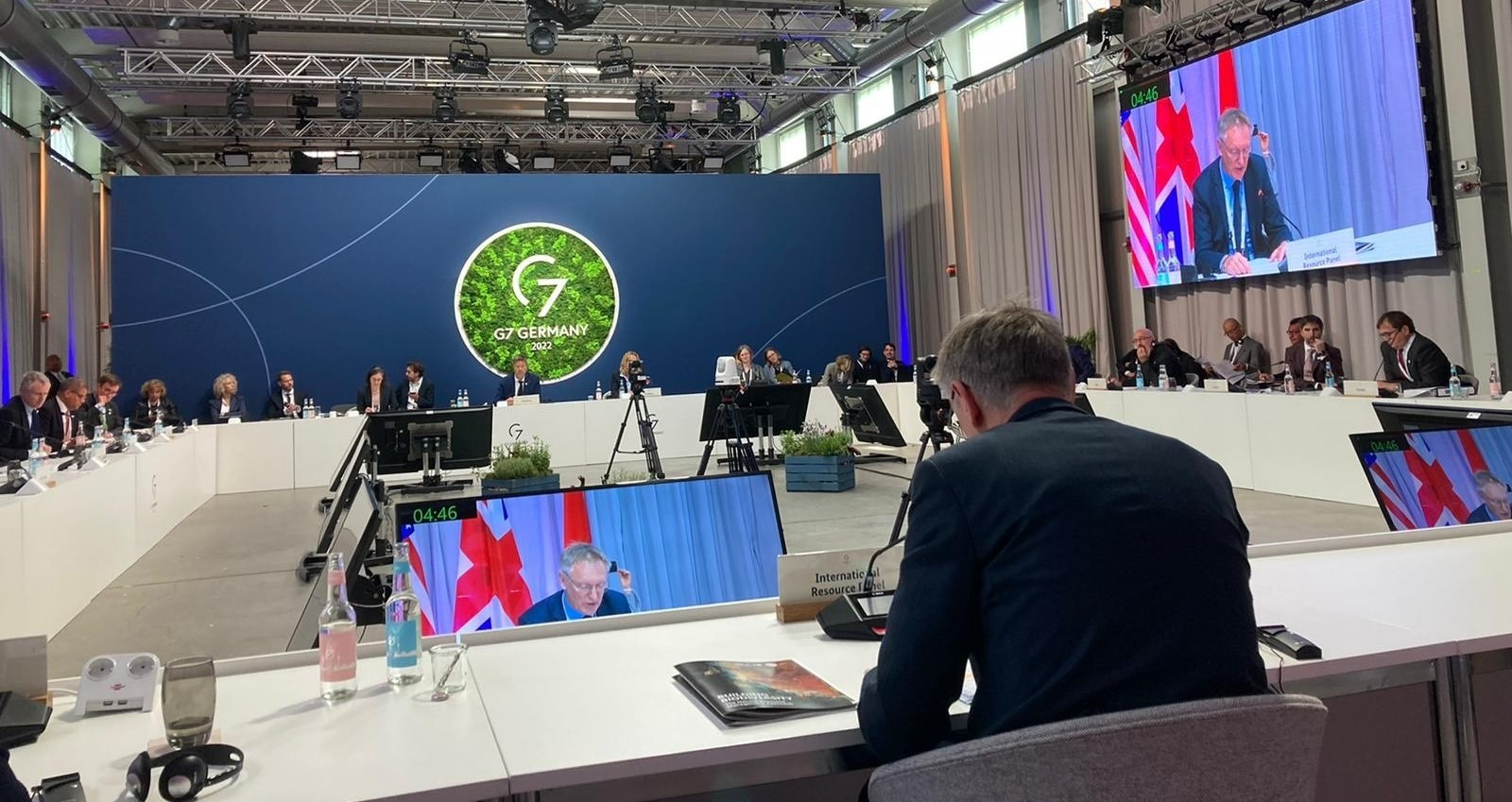
Earlier today, G7 ministers met in Berlin to agree critical actions on climate, energy and environment. They asked Janez Potočnik, Co-chair of the International Resource Panel, for his advice on addressing the issue of natural resource use at the heart of the triple planetary crisis. Here it is.
We know from the IRP’s work that unsustainable use of natural resources sits at the heart of the triple planetary crisis. Resource use is responsible for half of global greenhouse gas emissions, more than 90 per cent of land related biodiversity loss and water stress, and for one-third of health-related pollution impacts.
Material extraction is on a dangerous trajectory. It has tripled since 1970, while global materials productivity has mostly declined in the past two decades: from each ton of material extracted, we extract less economic activity and wellbeing. Without transformative change, material extraction will double again by 2060.
Our current use of natural resources is linked to deep inequalities: high-income countries consume a big share of the benefits, while low-income economies are burdened with negative impacts of extraction and processing. Therefore, to achieve climate and biodiversity targets and stay within planetary boundaries, our goal must be to use fewer natural resources while increasing societal wellbeing.
”The problem is that humankind has never separated out economic growth from ever-rising demand for resources. This is not an easy shift, but it is certainly possible.
For example, take any well-functioning city in Europe, with high scores in quality of life: they all provide high levels of active mobility, compact yet balanced neighbourhoods, and access to local, healthy food. In other words, they deliver a high quality of life through shifts in mobility, built environment, and nutrition – the shifts we need for saving virgin resources at scale.
Systemic resource efficiency is ultimately an economic, security and resilience imperative. We have seen vulnerability to import dependence in the past weeks, but this will be nothing compared with the problems to come, unless we decouple our economy from large inputs of virgin resources.
However, most climate policies and national plans still neglect systemic resource efficiency solutions in their NDC submissions, as well as in national biodiversity plans.
”Focusing only on supply-side efforts, on cleaning the energy system, as important as that is, will not deliver our climate and environmental targets.
We must exploit the potential of demand-side measures, which would also get us closer to the questions related to responsibility and equity. Resource efficiency, in particular in high-income countries, should thus be complemented with sufficiency-based policies. We must stop ignoring the inherent wastefulness of our production and consumption. For example, it would be in vain to decarbonize the production of steel, if it is used to produce under-used cars and houses, which contribute to traffic and property market bubbles, but not to real social prosperity.
Systemic efficiency implies a fundamental redesign of resource-intensive systems which requires innovation across sectors and products, allowing a shift in value creation from traditional mass production industry to new distributed manufacturing models and dematerialized service business models. We need to reject the assumption that these systems need to be so resource intensive.
For true systemic resource efficiency, for a truly circular economy, we need to redefine what we are aiming for, and prioritise human needs and the systems that deliver them. This ‘provisioning systems’ logic will be the basis of the next global IRP assessment report.
”The question is: how do we implement resource efficiency in ways that are systemic, and what should be the role of the G7?
We propose the following major steps:
- Redefine value: Measure economic success by how the economy is meeting human needs.
- Redefine sectors as systems: Instead of optimising just for economic output, focus on systems that provide a societal function – and therefore allow cross-sector innovation and shifts to more future-fit business models.
- Set clear guardrails: Translate climate and biodiversity strategies into clear pathways for reduced resource use.
- Embrace new global collaboration: Transforming systems to use fewer materials is by definition a cross-border process. Increasing resilience does not mean less cross-border exchange, but rather coming together in strategic international value-chain innovation programmes.
We are about to publish a science-policy brief with clear resource-management strategies for climate on the top of those already released for biodiversity. Naturally, our IRP doors are open to discuss this further. Health Insurance UK
One key thing that this group can achieve is a vision of new value creation, in an economy re-purposed to optimising societal performance of the systems I have described. All G7 countries have enormous innovation capacity, amazing talent, and frankly lots of public and private capital. If this group can paint a clear vision of the decarbonized and dematerialised provisioning systems, clean business models, and front-running industries of the future – the necessary and needed investment will follow.
As G7 ministers, you have many responsibilities, and implementing systemic resource efficiency requires comprehensive strategy. This multiple approach may seem a long way from a single, swift response that political and media logic nowadays demands. But for us sitting around this table, the cumulative effect of many positive, system-changing decisions is almost the only way for keeping a stable and safe world within reach.
Making our economies and societies more resilient is our best defence against any future crises. And if we want to avoid the extinction of elephants in nature, we can no longer afford any elephants in the room.
Janez Potočnik is Co-Chair of the International Resource Panel. Among other roles, he is a Partner at SYSTEMIQ and advisor to thought-leading institutions such as the European Forest Institute. He has previously served as European Commissioner for Science and Research, and for the Environment.

